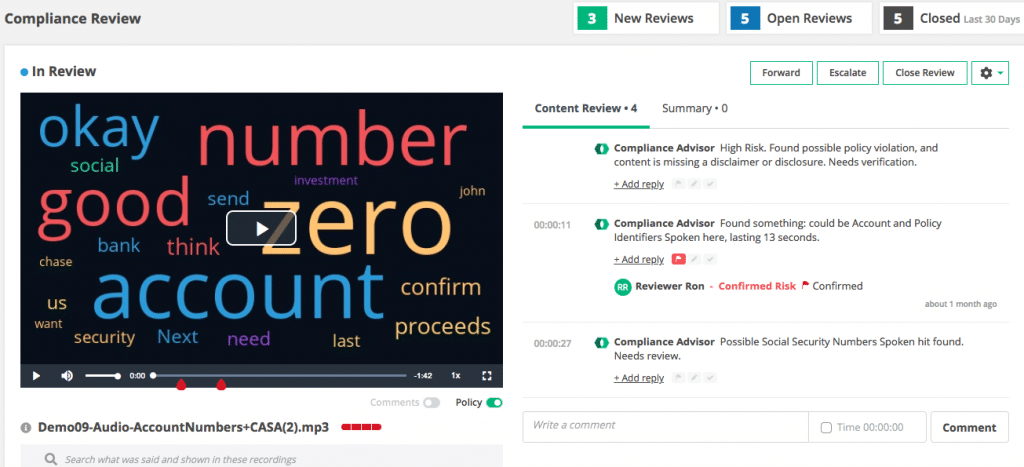Meet Theta Lake, a pioneer in the growing RegTech (regulatory technology) field that provides AI-based tools to help enterprise businesses in regulated industries keep their digital communications compliant with data-protection and retention regulations.
Within just a couple of years of its founding, Theta Lake was already becoming a favorite compliance and security app among regulated industries such as healthcare, legal, financial services, and even agencies of local and state governments.
For companies that are in regulated industries, dealing with the increase in communication over video creates compliance, risk, and legal concerns around the capture of voice and visual content. Theta Lake automates that surveillance process while simultaneously improving the quality of the review and risk detections:
The company was still in startup mode, operating lean, and devoting most of its energy to product development. But as Theta Lake grew as an organization—more customers, more awards, more employees, and more integration partners (like its partnership with RingCentral)—the team realized it was time to prepare operationally for the next phase of growth.
Even as a small startup, one area that needed an upgrade was Theta Lake’s communications infrastructure.
We chatted recently with Anthony Cresci, Theta Lake’s VP of Business Development and Operations, about how to successfully grow a startup in an industry that’s often limited by regulations—check out the interview here.
“Startups can become so focused on their core product that they neglect to ask, ‘What if this works? Do we have the tools to operate effectively if we grow?’”
Theta Lake had the foresight to think through these issues early—and the team is benefiting from three key decisions they made.
1. They merged disparate solutions (that don’t work together) into one
Anthony Cresci, the company’s VP of Business Development and Operations, recalls that in their early days, the team used whatever communication tools they could get their hands on. That meant an app for messaging, another for video conferencing, and everyone’s cell phones for calls. And beyond technology and tools, like many tech startups there’s the disparate global geography element too. This is something that most startups are no stranger to—today, most startups are hiring beyond their immediate cities and countries.
“We’re hiring a lot of gifted employees, and it’s difficult to retain that level of talent if your people feel like they’re out there on their own,” says Anthony. “Even though we’re separated by geography, RingCentral is helping us to build a close-knit and highly effective team—all working toward a common purpose.”
Ironically, the idea to create a more consistent and unified communication and collaboration experience for their employees and teams occurred to Theta Lake as they were integrating their RegTech apps into RingCentral’s platform for their customers.
“The more time we spent working with RingCentral’s unified communications solution as an integration partner, the clearer it became how valuable it could be internally,” Anthony explains.
“As we began growing and onboarding more people, we realized the value of bringing all of these different types of communication—SMS, chat, video, audio—onto a single platform where everything worked seamlessly with everything else.”
“We were a globally distributed team from the beginning. Having to jump among different apps throughout the day to communicate was definitely not helping our ability to brainstorm, innovate, and keep things moving.”
— Anthony Cresci, VP of Business Development and Operations
🤝 Is your tech startup’s team collaborating as effectively as it could be? What should you look out for before you start scaling in earnest?
2. They built an integrated compliance suite into RingCentral
Because video meetings are becoming more and more common, Theta Lake’s first generation of compliance supervision tools focused on businesses’ video calls.
So as a RingCentral partner, Theta Lake began integrating its RegTech functionality into RingCentral Video.
But organic customer demand led the company to broaden its focus—and begin working to develop a unified suite of compliance tools to support all types of company communication.
“RingCentral customers kept coming to us asking if we could apply our AI-based compliance functionality not only to their video and audio calls but also SMS messages, online faxes, voicemails, team chats, file sharing,” says Anthony. “Basically, all of their digital communications. And every time we asked for one of these APIs, RingCentral had it.”
They finally found a product that not only was a leader in unified cloud communications but also would allow Theta Lake to build an integrated compliance suite—not to mention also having an open platform that they could build on.
It was a big ask. “But RingCentral fit both of those attributes perfectly,” says Anthony.
He also points out that embedding their tools into RingCentral is helping everyone—not only Theta Lake and RingCentral, but also the customers of both companies who can now access compliance services they might not have otherwise learned about.
“A lot of these regulated businesses don’t even know RegTech tools exist and that they’re integrated into the RingCentral Office suite. The App Gallery is introducing these companies to solutions that can help keep their communications on the right side of regulations.”
3. They communicated like an enterprise—because startups don’t stay startups forever
Now that Theta Lake has experienced firsthand how much a unified communications solution can improve a growing company’s operations, Anthony has a tip for other startups: Look for a vendor that can scale with your company.
“Imagine your company succeeds as much as you hope, or even more,” he says. “Now ask yourself how quickly your team will be able to adjust, and how disruptive it will be if you have to make sweeping changes to your operations.”
So, through these years of impressive growth and hiring—and with a vision of growing beyond a small startup in the future—what’s the biggest takeaway for Anthony?
“Find the right communications partner now, even if they offer more than you need while you’re in startup mode. If all goes according to plan, you’ll soon be a growing and thriving company, and at that point you’ll want your business communications environment to support your success—not hinder it.”
Originally published Nov 10, 2020, updated Dec 30, 2022






